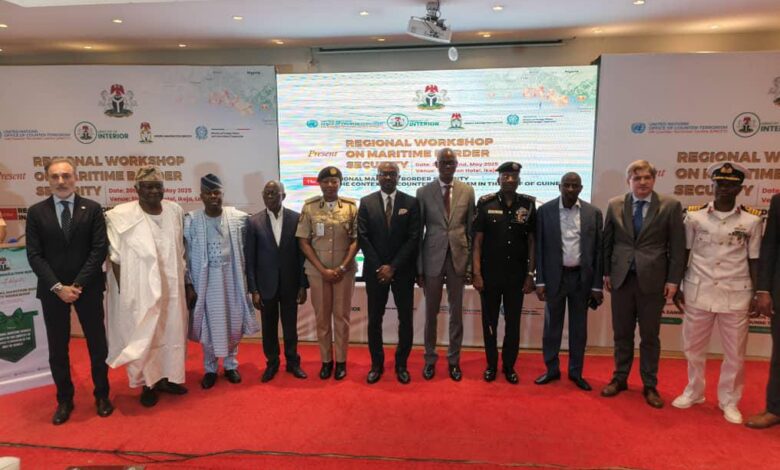
Titilayo ADELEKE
The Nigeria Immigration Service (NIS) on Tuesday, reiterated the need for improved maritime border security by ensuring that foreign terrorist fighters and other criminal elements do not exploit Nigeria’s territorial integrity.
Comptroller General of NIS, Kemi Nandap posited this at a three-day workshop organized by the service in collaboration with the United Nations Counter-Terrorism Centre (UNCCT).
While speaking, she emphasised the importance of inter-agency and regional collaboration for effective maritime border security in the Gulf of Guinea (GoG), as part of efforts to counter terrorism along the West African coast.
Comptroller-General of the Immigration Service, Kemi Nandap, made this known on Tuesday in Lagos at a three-day workshop organized by the service in collaboration with the United Nations Counter-Terrorism Centre (UNCCT).
Nandap stated that the NIS plays a pivotal role in maritime border security by ensuring that foreign terrorist fighters and other criminal elements do not exploit Nigeria’s territorial integrity.
She added that passenger facilitation and control of travel documents are at the core of all counter-terrorism interventions.
She stressed the need to prioritize cooperation, professionalism, and the deployment of cutting-edge technologies in the surveillance and management of borders. According to her, innovating countermeasures through advanced surveillance systems and communication technologies for early detection and response is urgently needed.
According to Nandap, maritime insecurity arising from illegal oil bunkering, fishing, piracy, armed robbery, and oil-related crimes threatens the safety of vessels and crew.
Speaking on the theme “Maritime Security in the Context of Counter-Terrorism in the Gulf of Guinea,” the Nigeria Immigration boss explained that the workshop is timely and appropriate for evaluating and rethinking security amid evolving maritime threats in the region.
She further emphasized that the workshop reinforced the collective resolve to tackle piracy, terrorism, illicit arms flow, migrant smuggling, human trafficking, stowaways, and other transnational organized crimes.
She stated, “We aim to achieve this through sound policies, capacity building, community engagement, collaboration, and regional partnerships along West Africa’s Atlantic coast. The Gulf of Guinea is known for piracy, especially near Nigeria.”
Primarily, Nandap pointed out that mitigating maritime threats in the region requires a broad spectrum of initiatives, including international collaboration and strengthening defense capabilities in the marine domain.
“Our threats are transnational, and so must be our response. No agency or government involved in border security and migration management can operate independently. The NIS is committed to collaborating with regional and global partners to facilitate safe, orderly, and regular migration at sea without compromising security.
“Let us conclude this workshop with clear action plans, stronger partnerships, and a renewed determination to secure the Gulf of Guinea for prosperity and peace.”
Earlier, in his opening remarks, Rocco Messina, representative of the United Nations Office of Counter-Terrorism (UNOCT), stressed that the workshop is convened at a time of growing recognition that threats faced in the maritime domain are interconnected and increasingly complex.
Messina added that in the Gulf of Guinea and the broader West African region, terrorism, piracy, organized crime, and trafficking are becoming more intertwined. He pointed out that the sea, once seen primarily as a channel of commerce and economic opportunity, has become vulnerable to exploitation by terrorist networks and criminal syndicates alike.
“At this very moment in New York, the UN Security Council is addressing the growing threats to maritime security and emphasizing the necessity for international cooperation to counter them. It highlights various challenges, including attacks on international shipping, piracy, transnational organized crime, and emerging risks posed by the exploitation of new technologies.
“These disruptions not only affect global trade but also threaten economic stability, food and energy security, and the safety of maritime infrastructure. The Security Council has expressed concern about these issues and emphasized the importance of maritime security in maintaining global peace.
“It underscores the need for states to enhance maritime domain awareness, improve risk management measures, and foster multidimensional responses to address diverse threats.
“It also emphasizes the importance of adhering to existing legal frameworks and advocates for improved coordination among states, international organizations, and the private sector.”
The event was also attended by Chairman of the Senate Committee on Interior, Comrade Adams Oshiomhole; Minister of Interior, Olubunmi Tunji Ojo; and other foreign diplomats and security chiefs from West and Central Africa.






